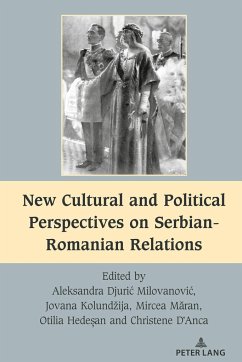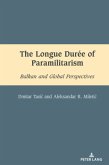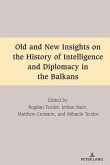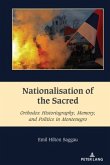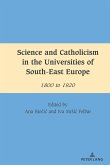Initiated by the Balkan History Association, this unique interdisciplinary volume explores the complex history of cultural, diplomatic and religious relations between Serbia and Romania during the late nineteenth and twentieth century. The authors, scholars with a wide range of academic backgrounds, address these themes in the context of Austro-Hungarian imperialism, the interwar period and the Communist era. The essays in Part I examine diplomatic, political and military relations, while those in Part II explore intellectual and artistic links between the two countries, including religion, literature and the visual arts.
This is a landmark publication, the first of its kind in English, and will leave readers with a more comprehensive understanding of cultural and political relations in Southeastern Europe.
"This volume, the first of its kind, covers political diplomatic, cultural and religious relations between the Romania and Serbia, seen through the processes that shaped the two nations over the past two centuries, but also through case studies of prominent diplomats, educators, artists, rulers and statesmen. The result is a comprehensive survey of Romanian-Serbian relations based on serious archival research, leading to new and more inclusive perspectives. I am quite convinced that the collection will become a standard guide for all those interested in the relations between Serbs and Romanians."
-Prof. Slobodan G. Markovich, University of Belgrade
"Historically, relations between neighboring nations and the people who populated them, have at various points been plagued by conflict. Yet it is difficult to cast complete blame on either side as it can be surmised that the actions taken were a result of people subject to their times. However, aside from confrontations, neighboring states also cooperated, fought together in the interest of common values, against invaders, while they also intermarried, thus enhancing both cultures. The present volume is a successful attempt by Romanian and Serbian specialists to find the political-diplomatic, cultural, and artistic interferences, that amounted to the elements of cooperation between Romanians and Serbs in the last centuries. Such instances of alliance, far from few in number, certainly prevailed in the history of the two nations, and they shaped the destiny of Romania and Serbia into the modern and contemporary eras."
-Prof. dr Ioan Bolovan, Institutul de Istorie "George Barit" Cluj-Napoca and University Babe -Bolyai Cluj-Napoca
This is a landmark publication, the first of its kind in English, and will leave readers with a more comprehensive understanding of cultural and political relations in Southeastern Europe.
"This volume, the first of its kind, covers political diplomatic, cultural and religious relations between the Romania and Serbia, seen through the processes that shaped the two nations over the past two centuries, but also through case studies of prominent diplomats, educators, artists, rulers and statesmen. The result is a comprehensive survey of Romanian-Serbian relations based on serious archival research, leading to new and more inclusive perspectives. I am quite convinced that the collection will become a standard guide for all those interested in the relations between Serbs and Romanians."
-Prof. Slobodan G. Markovich, University of Belgrade
"Historically, relations between neighboring nations and the people who populated them, have at various points been plagued by conflict. Yet it is difficult to cast complete blame on either side as it can be surmised that the actions taken were a result of people subject to their times. However, aside from confrontations, neighboring states also cooperated, fought together in the interest of common values, against invaders, while they also intermarried, thus enhancing both cultures. The present volume is a successful attempt by Romanian and Serbian specialists to find the political-diplomatic, cultural, and artistic interferences, that amounted to the elements of cooperation between Romanians and Serbs in the last centuries. Such instances of alliance, far from few in number, certainly prevailed in the history of the two nations, and they shaped the destiny of Romania and Serbia into the modern and contemporary eras."
-Prof. dr Ioan Bolovan, Institutul de Istorie "George Barit" Cluj-Napoca and University Babe -Bolyai Cluj-Napoca
"This volume, the first of its kind, covers political diplomatic, cultural and religious relations between the Romania and Serbia, seen through the processes that shaped the two nations over the past two centuries, but also through case studies of prominent diplomats, educators, artists, rulers and statesmen. The result is a comprehensive survey of Romanian-Serbian relations based on serious archival research, leading to new and more inclusive perspectives. I am quite convinced that the collection will become a standard guide for all those interested in the relations between Serbs and Romanians." -Prof. Slobodan G. Markovich, University of Belgrade "Historically, relations between neighboring nations and the people who populated them, have at various points been plagued by conflict. Yet it is difficult to cast complete blame on either side as it can be surmised that the actions taken were a result of people subject to their times. However, aside from confrontations, neighboring states also cooperated, fought together in the interest of common values, against invaders, while they also intermarried, thus enhancing both cultures. The present volume is a successful attempt by Romanian and Serbian specialists to find the political-diplomatic, cultural, and artistic interferences, that amounted to the elements of cooperation between Romanians and Serbs in the last centuries. Such instances of alliance, far from few in number, certainly prevailed in the history of the two nations, and they shaped the destiny of Romania and Serbia into the modern and contemporary eras." -Prof. dr Ioan Bolovan, Institutul de Istorie "George Barit" Cluj-Napoca and University Babe -Bolyai Cluj-Napoca

